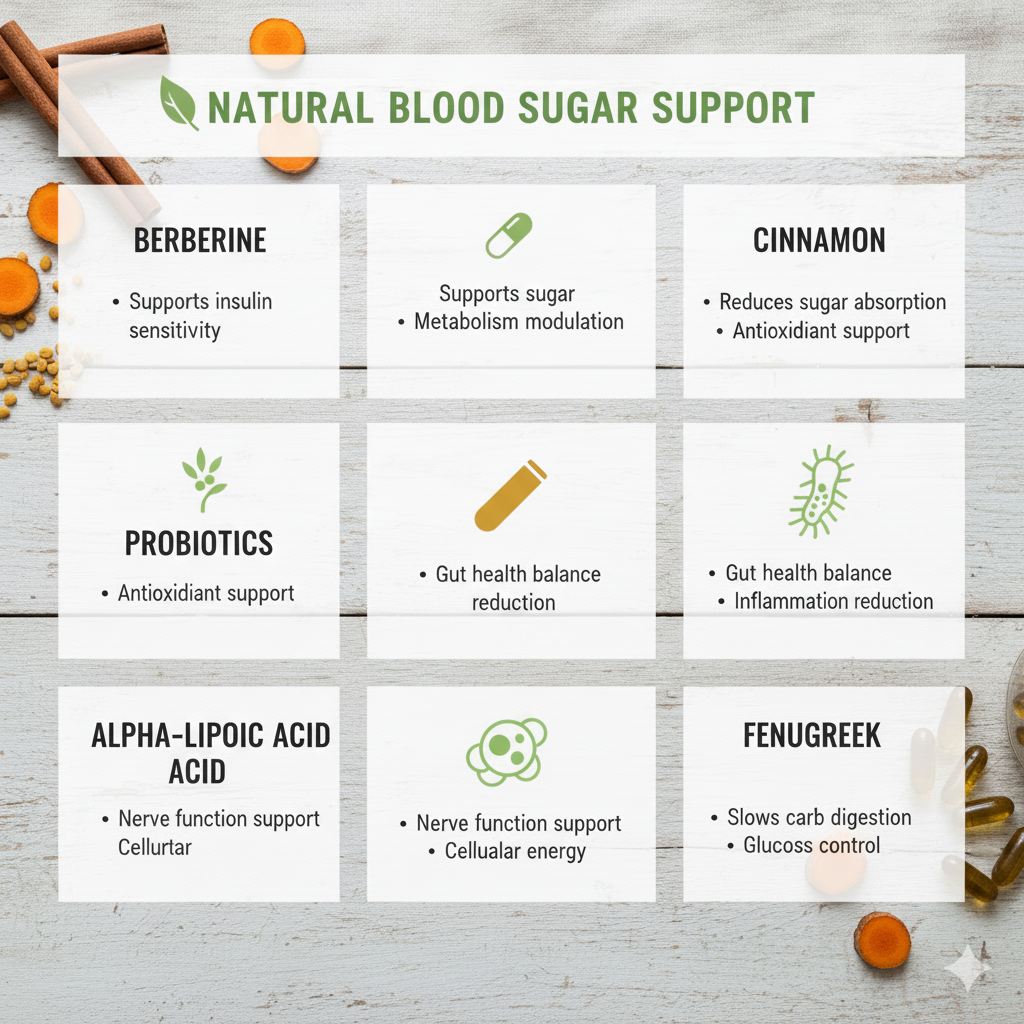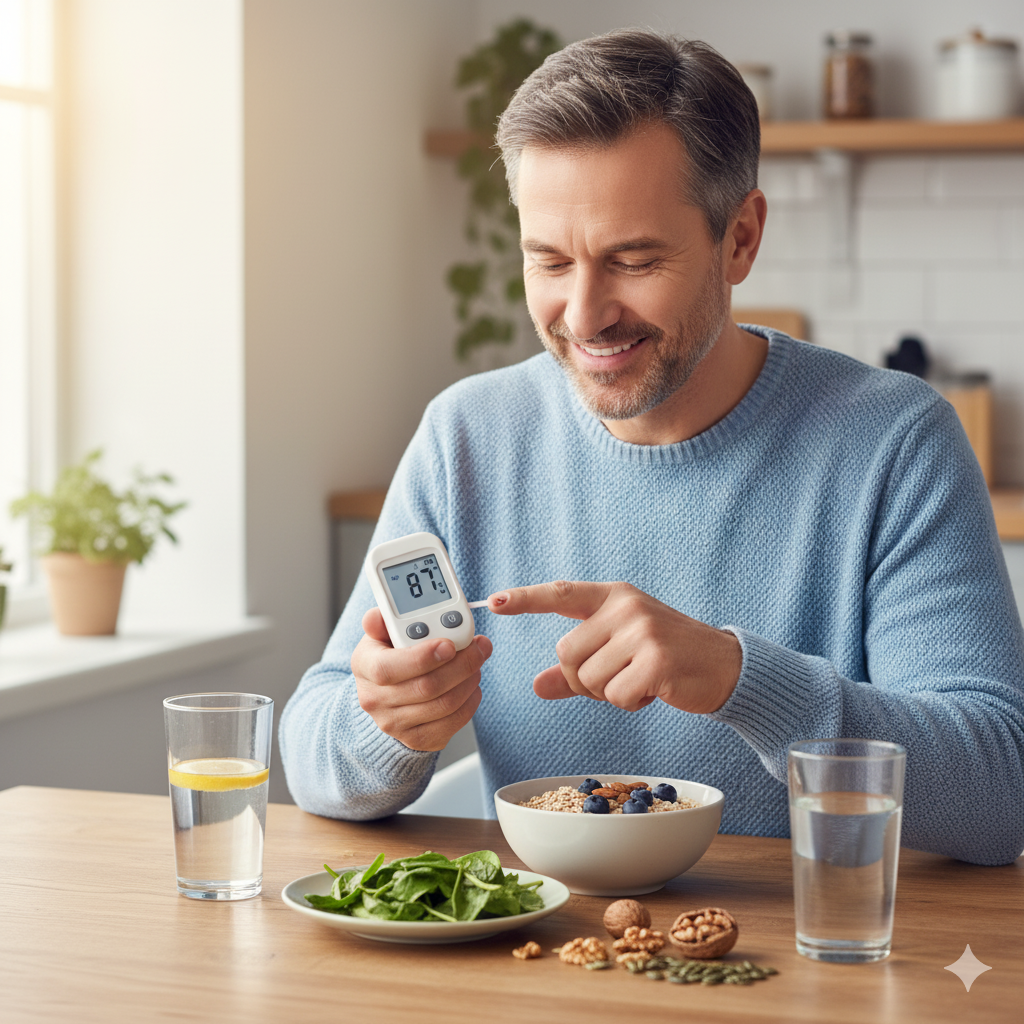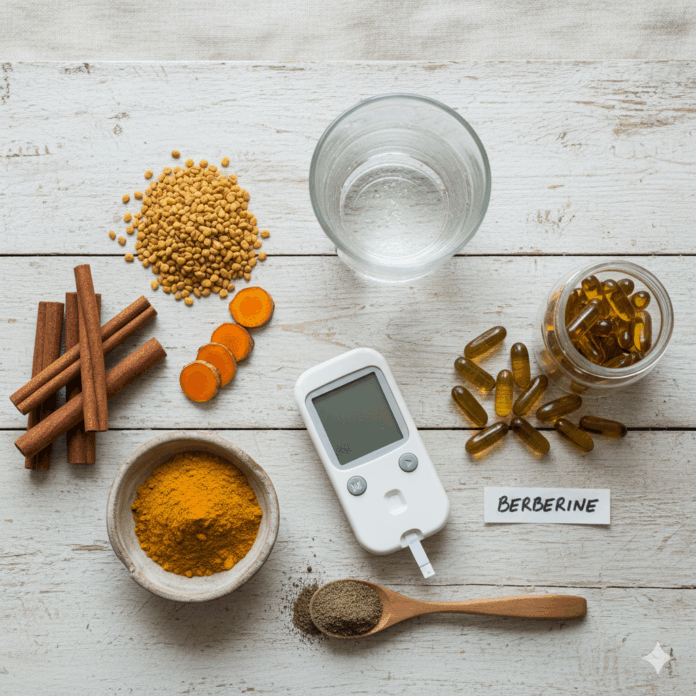Managing blood sugar is a daily challenge for many people, especially those with prediabetes or type 2 diabetes. It affects how your body turns food into energy and how well your cells respond to insulin. When blood sugar levels stay high, it can lead to fatigue, blurred vision, and long-term health issues like heart disease and nerve damage.
While medications and lifestyle changes—such as eating a balanced diet, staying active, and reducing stress—are central to controlling blood sugar, some natural supplements show promise as helpful “adjuncts.” These supplements may support your body’s natural ability to use insulin more effectively, reduce sugar absorption, and fight inflammation linked to high glucose levels.
In this article, we’ll explore natural supplements that may help lower blood sugar, explain what current research says, highlight important safety considerations, and share practical tips on how to use them wisely as part of a healthy routine.
Why Some People Look to Natural Supplements for Blood Sugar
When blood sugar is chronically high, it can damage organs, nerves, and blood vessels over time. Standard care includes diet, exercise, weight control, and sometimes medication. But many people want safe, natural ways to enhance their efforts.
Supplements may:
- Improve insulin sensitivity (so your body uses insulin better)
- Reduce glucose absorption in the gut
- Support pancreatic beta cells
- Reduce inflammation or oxidative stress, which contribute to insulin resistance
However, it’s critical to know: supplements are not a substitute for medical treatment. The American Diabetes Association states that supplements are not proven as stand-alone treatments for lowering blood glucose. (diabetes.org)
That said, some clinical trials and meta-analyses suggest modest benefits in certain cases. (PMC)
Top Natural Supplements That Show Promise

Below are supplements with potential benefits, along with what the research actually says, dosing hints, and caveats.
1. Berberine
Berberine is a plant alkaloid found in herbs like Berberis, used traditionally in Chinese and Ayurvedic medicine. (NCBI)
What the evidence says:
- A meta-analysis (with multiple trials) showed that doses of 0.9–1.5 g per day can reduce fasting blood glucose and post-meal glucose levels. (diabetesjournals.org)
- Another review found it may lower A1C by ~0.5% or more in some people. (guidelines.diabetes.ca)
Considerations & safety:
- May interact with drugs (e.g. metformin, warfarin).
- Gastrointestinal side effects (diarrhea, cramping) are possible.
- Long-term safety data are limited.
- Always consult your doctor before use.
2. Cinnamon
Cinnamon (especially Ceylon or Cassia) has received lots of attention for its possible anti-glycemic effects. (Cleveland Clinic)
What the evidence says:
- Some trials used 1–6 g per day (in powder or extract form) and found reductions in fasting glucose, lipids, and insulin levels. (diabetesjournals.org)
- However, results are inconsistent. Some studies show benefit, others don’t. (Mayo Clinic)
Cautions:
- Large amounts of cassia cinnamon contain coumarin, which may harm the liver if intake is high.
- It should not replace medical therapy. The ADA does not recommend relying solely on cinnamon to control blood glucose. (Cleveland Clinic)
3. Probiotics
Emerging research links gut health and blood sugar control. Some probiotic strains may help improve insulin sensitivity. (PMC)
Evidence highlights:
- A meta-analysis showed that probiotic supplementation significantly reduced glucose levels in some populations. (PMC)
- Possible benefits for inflammation, which is tied to insulin resistance. (ScienceDirect)
Notes & tips:
- Effects depend on strains, dosage, duration.
- Choose well-studied strains (e.g. Lactobacillus, Bifidobacterium).
- If you have a health condition or immunocompromise, check with your doctor first.
4. Alpha-Lipoic Acid (ALA)
ALA is an antioxidant that has been studied for diabetic neuropathy and metabolism. (NCCIH)
Evidence & use:
- Some studies suggest it may modestly improve insulin sensitivity and reduce oxidative stress.
- It’s more often studied for nerve pain in diabetics.
Cautions:
- May lower blood sugar; watch for hypoglycemia if used with medications.
- Possible side effects: digestive upset, skin rash, or low thyroid in certain cases.
5. Fenugreek
Fenugreek seeds have high fiber and bioactive compounds that may slow down glucose absorption. (NCBI)
What evidence shows:
- In some trials, fenugreek reduced postprandial glucose and improved fasting levels.
- Its soluble fiber content is partly responsible.
Caution:
- May cause gas, bloating; reduce dose if that happens.
- If you’re pregnant or planning pregnancy, talk to your doctor first.
6. Gymnema Sylvestre
In traditional Ayurvedic medicine, Gymnema is known as “gurmar,” meaning “sugar destroyer.” (Wikipedia)
Mechanisms & evidence:
- May block sugar absorption in the intestines. (Wikipedia)
- Some small human trials suggest it may improve glucose levels when paired with standard treatment.
Cautions:
- Can lower blood sugar significantly; beware of hypoglycemia if on medications.
- Always monitor levels if you try it.
7. Vitamin D
Vitamin D is a nutrient many people are low in, and it may play a role in insulin function. (MDPI)
What research says:
- Some evidence suggests vitamin D supplementation can improve insulin sensitivity in deficient individuals. (MDPI)
- However, the effect is modest and not guaranteed in people with already normal levels.
Cautions:
- Excessive vitamin D may lead to calcium issues; stay within safe dosage.
- Have your blood levels tested before high-dose supplements.
Smart Tips for Using Natural Supplements Safely

Using these supplements without a clear plan or medical guidance can be risky. While natural doesn’t always mean safe, following a smart strategy can help you get the most benefit and avoid side effects. Always remember that balance, consistency, and safety matter most when adding supplements to your daily routine. Follow these tips to stay safe and maximize results:
✔ Talk to your healthcare provider first
Your doctor or pharmacist can help you choose supplements that fit your needs and won’t interfere with your current medications. This step is especially important if you already take blood sugar–lowering drugs, have kidney or liver issues, or are pregnant or nursing. Professional guidance can help you avoid serious interactions or complications.
✔ Start with one supplement at a time
It can be tempting to try several at once, but doing so makes it hard to tell what’s actually working. Begin with just one supplement, and track how your body responds. If you notice improvements—or side effects—you’ll know exactly which product caused them.
✔ Monitor blood sugar regularly
Testing your fasting and post-meal blood sugar levels helps you see if the supplement is making a real difference. Keep a simple log or use a glucose monitor app to record changes over time. This habit also helps you and your healthcare provider adjust your plan if needed.
✔ Use evidence-based dosages
Stick to amounts that have been tested in clinical studies. More isn’t always better. For example, research shows berberine works well around 1 gram per day, but higher doses may cause stomach upset. Following proven dosages keeps you safe and increases the chance of positive results.
✔ Watch for interactions
Some supplements can affect how prescription drugs work. For instance, herbs like cinnamon or gymnema may intensify the effects of diabetes medications, leading to low blood sugar. Always double-check labels and talk to your doctor before mixing products.
✔ Remember: supplements support, not replace, lifestyle
No pill or powder can take the place of healthy habits. Keep focusing on a balanced diet, regular exercise, enough sleep, and stress management. When combined with these core habits, supplements can play a valuable supporting role in keeping your blood sugar under control.
Why the Evidence Is Mixed (And What That Means for You)
You may wonder: if some trials show benefits, why do others not? Several reasons:
- Different study designs: small size, short duration, different doses.
- Participant variation: age, health status, medication use differ.
- Supplement quality: purity, bioavailability vary among brands.
- Publication bias: studies showing no effect are less likely to be published.
Because of this, guidelines are cautious. Some natural products have shown a drop in A1C ≥ 0.5% in certain trials, but overall conclusions remain tentative. (guidelines.diabetes.ca)
The key takeaway: natural supplements are tools, not magic bullets.
Sample “Stack” Ideas (just examples, not medical advice)
Here are a few combination ideas that some people explore (again: get medical approval first):
| Goal | Possible Supplement Combo | Notes |
|---|---|---|
| Improve fasting glucose | Berberine + Vitamin D (if deficient) | Use tested dose of berberine (≈1 g/day) |
| Control post-meal spikes | Gymnema + Fenugreek | Use both before meals |
| Support gut / insulin link | Probiotic + Cinnamon (low dose) | Monitor response closely |
Each combination should be trialed one change at a time to track effect and risk.

When You Should Avoid or Stop Supplements
There are times when natural supplements are not safe:
- You are pregnant or breastfeeding
- You have serious kidney, liver, or heart disease
- You are taking insulin or multiple blood sugar–lowering meds
- You experience side effects like stomach pain, allergic reaction, or hypoglycemia
If blood sugar drops too low, stop and consult your provider.
Conclusion: A Balanced View on Natural Supplements and Blood Sugar
Natural supplements can be interesting allies in a blood sugar control plan. Some—like berberine, cinnamon, probiotics, vitamin D, and gymnema—have studies backing modest benefits. But none are miracle cures, and their effects vary from person to person. Safety, interactions, and quality matter a lot.
I encourage you: if you try a supplement, treat it as an experiment. Watch your numbers, stay in touch with your doctor, and always prioritize foundational habits like nutrition, movement, stress reduction, and sleep.
Do you have experience with any of these supplements? What changes did you notice (if any)? Let me know in the comments below—I’d love to hear your story, answer questions, or help you think through your options.

